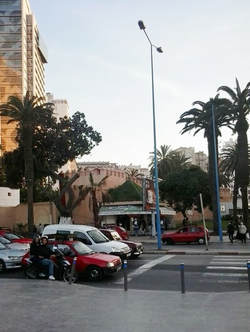|
My dissertation has been published online. To access it, please click here: Tradition as Flow: Decolonial Currents in the Muslim Atlantic.
Here are videos 2 and 3 from the series summarizing my dissertation findings:Here is video 1 of 5 presenting my dissertation findings. Yes, I successfully defended my dissertation on May 26th, 2020 (al-hamdulilah). The full text of the dissertation will be published and made available online this summer (in sha Allah). In the meantime, I am publishing videos presenting my research findings. Stay posted in the coming weeks for the other 4 videos of this series. Comments and questions are welcome. Enjoy! Here is a slideshow with photos from my travels in Morocco and Southern Spain in 2018 and 2019. Enjoy!  I am honoured to be teaching this summer course in Morocco with my mentor and friend, Professor Ali Zaidi. It is a full-credit course for Laurier University undergraduates , offered jointly by the Global Studies Department and the Department of Religion and Culture. Overview: Spring 2019, May 20-24 at Laurier June 1-18 in Morocco Stay in the capital, Rabat Take excursions to Casablanca, Tangiers, Fez, Meknes, and UNESCO sites Experience Ramadan and Eid during 5-day homestay Witness the effects of coloniality, capitalism and the refugee-crisis There are still some places left in the course I will be teaching next winter (in sha Allah), but I am glad to see it is filling up fast. I am really happy to be teaching this course. I think teaching intro level courses is a really important part of an academic's tasks. These courses can lay the foundations of so much in the lives of the learners. It was an intro to Islam course taught by my dear mentor Sheila McDonough nearly three decades ago that opened the way to my becoming a specialist in Muslim Studies.
Here is the description from the Laurier University website: MZ200 Introduction to Muslim Studies 0.5 Credit This course provides an overview of the aims, methods, and central issues in the Muslim Studies field. In particular it will investigate the diversity of contemporary Muslims, ideational currents that are influencing them, and the major debates about Islamic identity. Sorry I haven't been keeping this page updated lately. I have been so busy with fieldwork, research, teaching, and all the other aspects related to the academic life, that I have neglected my online duties. The slideshow below gives you an indication of some of the things I have been up to. Hopefully, more detailed entries related to the activities presented in these selfies will come soon. My book review of The Sultan and the Queen: The Untold Story of Elizabeth and Islam, by Jerry Brotton, has just been published in Nūr: The Newsletter of the Center for Arab and Islamic Studies — Fall 2017 (Vol. 3, No. 1). The Center for Arab and Islamic Studies, at St. Bonaventure University, is directed by Fr. Michael D. Calabria, OFM, PhD. I had the pleasure of meeting him last April, at the Annual Meeting of the Eastern International Region of the American Academy of Religion. That is when he suggested I write a review of this book.
http://www.sbu.edu/docs/default-source/franciscan-institute2/Center-for-Arab-Islamic-Studies/nur-fall-2017.pdf?sfvrsn=0 I had lost hope that this book chapter would get published, but I have the book in my hands at last!
J'ai enfin entre les mains une copie du livre dans lequel un article que j'ai écrit en 2012 a été publié! J'avais perdu espoir que cette publication verrait le jour, mais j'avais tort! Voici l'information bibliographique : Sparkes, Jason. “Analyse comparative de la doctrine et des pratiques contemporaines de la voie soufie Burhaniya dans le monde arabe et en Occident.” Migrations et croyances : entre inculturation et acculturation, Samia Amor, Denitsa Tsvetkova et Patrice Brodeur (dir.), 123–43. Montréal: Association francophone pour le savoir-Acfas, 2016. |
AuthorTransdisciplinary scholar of Islam and Sufism. Archives
March 2023
Categories
All
|
 RSS Feed
RSS Feed
